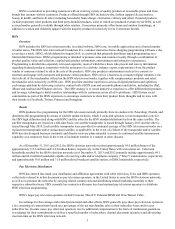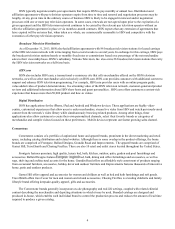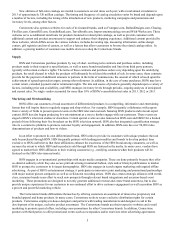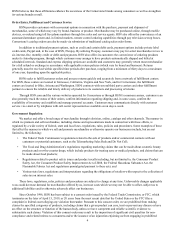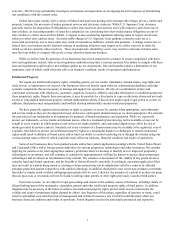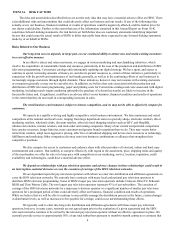Home Shopping Network 2013 Annual Report Download - page 15
Download and view the complete annual report
Please find page 15 of the 2013 Home Shopping Network annual report below. You can navigate through the pages in the report by either clicking on the pages listed below, or by using the keyword search tool below to find specific information within the annual report.13
We are currently the subject of a consent order issued by the FTC and violation of this consent order could result in
significant civil penalties and/or an injunction enjoining HSN from engaging in prohibited activities, among other penalties
or remedies.
In October 1996, HSN became subject to a consent order issued by the FTC which terminates on the later of April 15,
2019, or 20 years from the most recent date that the United States or the FTC files a complaint in federal court alleging any
violation thereunder. Pursuant to this consent order, HSNi (including its subsidiaries and affiliates) is prohibited from making
claims for specified categories of products, including claims that a given product can cure, treat or prevent any disease or have
an effect on the structure or function of the human body, unless it has competent and reliable scientific evidence to substantiate
such claims. Violation of this consent order may result in the imposition of significant civil penalties for non-compliance and
related redress to consumers and/or the issuance of an injunction enjoining us from engaging in prohibited activities. The FTC
periodically investigates our business and operations on an ongoing basis for purposes of determining its compliance with the
consent order.
We may be subject to claims for representations made in connection with the sale and promotion of merchandise or
for harm experienced by customers who purchase merchandise from us.
The manner in which we sell and promote merchandise and related claims and representations made in connection
with these efforts is regulated by federal, state and local law. We may be exposed to potential liability from claims by
consumers or from federal, state and local regulators and law enforcement agencies, including, but not limited to, for personal
injury, product safety, wrongful death and damage to personal property relating to merchandise sold and misrepresentation of
merchandise features and benefits. In certain instances, we have the right to seek indemnification for related liabilities from our
vendors and may require such vendors to carry minimum levels of product liability and errors and omissions insurance. These
vendors, however, may be unable to obtain suitable coverage or maintain this coverage on acceptable terms; this insurance may
provide inadequate coverage against all potential claims or may not even be available with respect to a particular claim. If
insurance is insufficient or unavailable, our vendor may have insufficient resources to cover their indemnification obligations,
or if our vendor ceases to do business, our results of operations would be negatively impacted. Even if vendors can satisfy their
financial obligations, our brand and reputation could be negatively impacted.
Failure to effectively manage our Flexpay program could result in unplanned losses.
HSN offers Flexpay, a program which customers may pay for certain merchandise in two to six interest-free, monthly
credit or debit card installments. This is an effective tool for driving sales, primarily for higher-priced items. We maintain
allowances for estimated losses resulting from the inability of customers to make required payments. While actual losses due to
the inability of customers to make required payments have historically been within estimates, they may increase in a given
period or exceed related estimates. As Flexpay usage continues to grow, we may experience these losses at greater rates, which
will require us to maintain greater allowances for doubtful accounts of estimated losses than we have historically. To the extent
that Flexpay losses exceed historical levels, our results of operations may be negatively impacted.
We may fail to protect our intellectual property rights within the full scope and manner available to us under
applicable law or statute or may be accused of infringing upon the intellectual property rights of third parties.
We regard our intellectual property rights, including patents, service marks, trademarks and domain names, copyrights
and trade secrets, as critical to our success. We rely heavily upon software, databases and other systemic components that are
necessary to manage and support our business operations.
We are subject to legal proceedings and claims in the ordinary course of business, including claims of alleged
infringement of the trademarks, copyrights, patents and other intellectual property rights of third parties. In addition, litigation
may be necessary in the future to enforce our intellectual property rights, protect trade secrets or to determine the validity and
scope of proprietary rights claimed by others. Any litigation of this nature, regardless of outcome or merit, could result in
substantial costs and diversion of management and technical resources, any of which could adversely affect our business,
financial condition and results of operations. Patent litigation tends to be particularly protracted and expensive. Our failure to
protect our intellectual property rights in a meaningful manner or challenges to related contractual rights could result in erosion
of brand names and limit our ability to control marketing on or through the internet using our various domain names or
otherwise, which could adversely affect our business, financial condition and results of operations.


